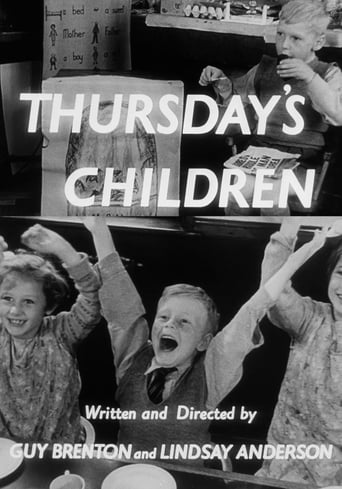

terrible... so disappointed.
... View MoreThe film's masterful storytelling did its job. The message was clear. No need to overdo.
... View MoreStory: It's very simple but honestly that is fine.
... View MoreThe joyful confection is coated in a sparkly gloss, bright enough to gleam from the darkest, most cynical corners.
... View MoreThursday's Children is maybe best known as an early work from Lindsay Anderson who would go on to critical acclaim as the director of films such as If (1969). In fact, this is really no inconsequential work given the fact that it actually won an Oscar for best short documentary. Narrated by Richard Burton, it focuses on the children from the Royal School for the Deaf in Margate. It considers their situation in life and some of the difficulties that teaching them presents.It's a pretty minimalistic documentary in fairness and is one which is really of fairly selective interest nowadays. For Anderson scholars, it offers another facet of his work and I guess it ties in with some themes he would delve into with If, in its focus on private schools. Except, unlike that movie, the message regarding the school system here is clearly a positive one. It is interesting to see an example of the teaching that was normal back at the time and it does show some of the aspects that appear particularly archaic now, such the a story character who is particularly popular with the children called Little Sambo! Obviously that is something that could never be used now but these were different, more innocent times. On the whole, this is a film of fairly minor interest to be honest but it is valuable enough as a time-capsule piece.
... View MoreThis won the Academy Award for Documentary Short. There will be mild spoilers ahead:It gave me pause when I thought that the youngest of the children in this documentary (any of them still living) are 64 now. The teaching techniques used are, of course, no longer current, though the Royal School at Margate (established in 1792) is still active.The thing I found most fascinating is that the primary techniques shown were designed to try to help deaf children function in a world not readily designed for them and to interact with people who might not really want to make the time or effort to interact with them. Learning sign language is useful in a limited sense, in that it only works if the other party in the conversation speaks it as well. This is akin to learning any other language. One can no more "speak" sign language with someone not conversant in sign than you can speak German to someone who doesn't know German.At least with teaching children to lip read, they can have a chance to understand what is going on around them. It's imperfect, but so is every "remedy" which has been devised to overcome the limitations arising from deafness (or any other difficulty a person might need to handle in life).Full disclosure-I am disabled and use crutches and a wheelchair. I live in a world designed for the majority, which means I run into all sorts of obstacles which aren't obstacles to people who can walk without aids (which, interestingly enough, includes many deaf people).This is an extra on the Criterion release of Lindsay Anderson's ...If and is well worth seeking out. Recommended.
... View MoreThe subject deals with the children at The Royal School for the Deaf in Margate, Kent. The hearing-handicapped children are shown painstakingly learning what words are through exercises and games, practicing lip-reading and finally speech. Richard Burton's calm and sometimes-poetic narration adds to the heartwarming cheerfulness and courage of the children.Pretty much as it sounds, this was how deaf children were taught in Britain in the 1950s. I do appreciate that the film starts with a disclaimer that children are no longer taught this way. I was thinking they were warning me of some bad treatment I was going to see, but there was nothing offensive in the documentary at all.
... View MoreBrilliant Oscar-winning documentary about a school for deaf children. One of - the sometimes slightly grumpy - Lindsay Anderson's more altruistic and poetic moments. The film is almost completely silent (with music and narration, though), which gives you a good sense of how these children must perceive the world around them. For years it was almost impossible to find this wonderful little movie other than on 16mm film, but in 2007 the Criterion edition of Anderson's masterpiece 'if....' included 'Thursday's Children' as a bonus. The film is narrated by Richard Burton and was co-directed by Guy Brenton. Anderson shot this simultaneously with another short, the satirical amusement park portrait 'O Dreamland' (1953).
... View More